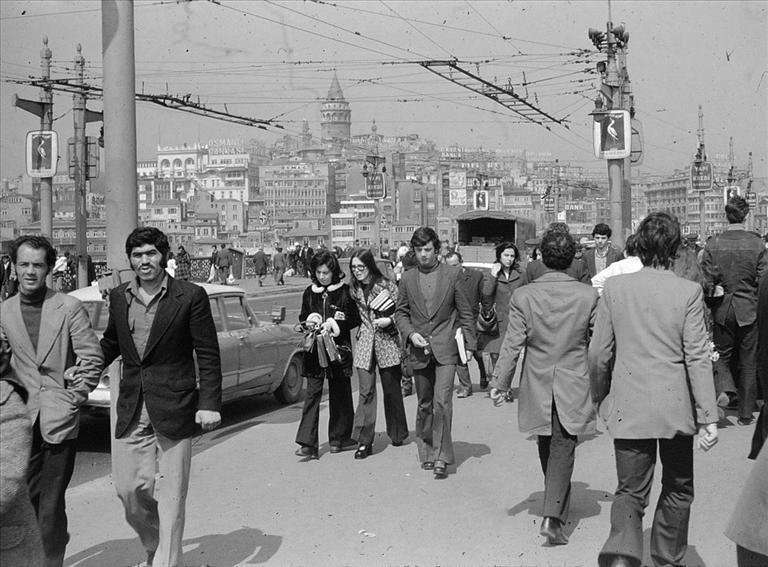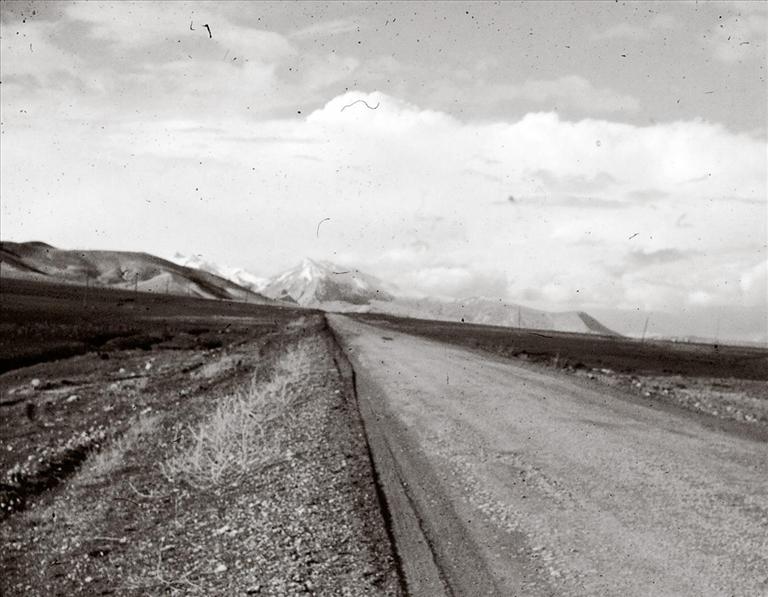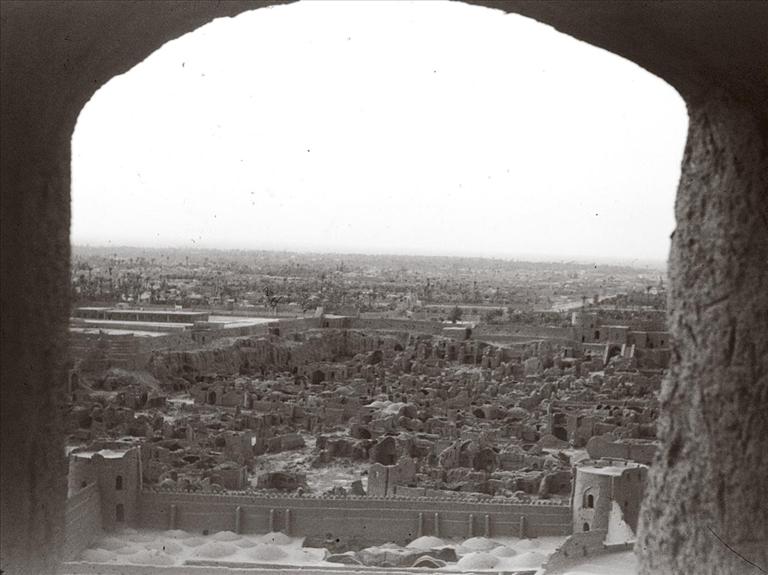Footloose Scot (16 page)
Authors: Jim Glendinning


GALATA BRIDGE, ISTANBUL

HIGHWAY, EASTERN TURKEY

DESERTED CITY OF BAM, IRAN

MOSQUE, ISFAHAN, IRAN
Eventually we reached the Pakistan border, and the road improved. At a place called Nok Kundi we saw a sign saying Dak Bungalow and I said "Let's spend a night there." I had heard about Dak bungalows from an uncle who in prewar days had been an officer in the Indian Army. He had used this accommodation frequently when travelling. Dak bungalows, he said, pronouncing them "Dawk," were inexpensive and clean Government-run rest houses, open to the public. We checked in and it proved to be just as described forty years previously. After a few days of worry travelling across southern Iran, we felt we deserved this comfort.
We next arrived at Quetta, the capital of Baluchistan province. At 5,400 feet, with a population of over half a million and strategically located close to southern Afghanistan, Quetta had long been an important military base. A hotel keeper said he had no rooms available, and there were none free in the whole town. A regional political conference was about to take place, and feelings were running high There was tension in the air, and many police on the streets. He suggested we move on and head for the Afghan border at Spin Baldak. Leaving Pakistan we showed our documents to a policeman who was examining the contents of his nose with a finger. With the same hand he reached out for our passports. "Yuck," said Christine with disgust.
From Kandahar, our first town in Afghanistan, we turned northeast along an American-built highway towards Kabul, 320 miles distant. Herds of sheep and goats grazed on either side of the road, and a mountain range loomed in the background. We passed through small towns, stared at by ancient bearded men with lined faces. Compared to Iran, Afghanistan looked poor and as if nothing changed much: lots of hand pulled carts, rundown buildings, old vehicles on the roads, the women in veils, grubby kids dashing around and men wearing the wool berets called pakols. Everything looked weathered and worn; this was a very ancient world.
Our Trailfinders guidebook warned against the dangers of driving in this dirt-poor country, in particular the risk of being involved in any accident when a bag of sheep's blood might be thrown at our vehicle to prove injury to an Afghani, with a resultant heavy fine. We didn't have any traffic scares and duly arrived in Kabul where the guide recommended "Mustafa Hotel, near the Green Door Bazar, Rooms 120 Afghanis. Hot Showers. Restaurant downstairs".
We were eating lamb kebabs in a Kabul restaurant the next day when we noticed two policemen inspecting Bedford. Thinking nothing of it, we finished our coffee and went out to the street to find all four of Bedford's tires had been deflated, but not completely, and we were able to drive to a gas station for air. Was this a warning or a joke? We had no one to ask and it remained a mystery. There was little to do or see in Kabul once we had visited the Kabul Museum and walked along the walls of the old citadel, Bala Hissar so we headed east again. Little did we know that the Soviet invasion was only four years away, to be followed by the Civil War of the 1990s, and later the invasion by the USA and NATO.
Bedford was still doing just fine but we decided not to drive to the huge 6
th
century statues of Buddha carved into the side of a sandstone mountain near Bamyan. The site was only 143 miles northwest of Kabul but the road went over the high pass at over 8,000 feet and we were told was fit for 4-wheel drive vehicles only. That was our mistake and loss, since in 2001 these unique, inspiring sculptures were blown up by the Taliban.
An hour and a half from Kabul we passed through Jalalabad, the last town before the Khyber Pass. Here in January 1842, military surgeon Dr.W. Brydon , suffering from a gash in the head, rode into town on an exhausted horse, the sole survivor of a British army of 4,500 retreating from Kabul. All the rest had been killed. He only survived an Afghani sword thrust because he had stuffed a copy of
Blackwood's
magazine in his hat, which deflected the blow.
Soon we were driving through the famous Khyber Pass, dropping steeply down to the plains of Pakistan and the Indian subcontinent. The rocky hillsides were dotted with regimental memorials of British Army regiments which had fought there. The British Army fought three campaigns including the disastrous one of 1842 mentioned above, and eventually left. Soon we were in Pakistan maneuvering our way through the teeming streets of Peshawar, a city of over 2 million, strategically situated at the crossroads of central Asia at the approach to the Indus Valley. Now at least, language was not such a problem.
Next came the border with India at Wagah, where we were delayed for 24 hours since it was closed. The next day we saw why. Long columns of Pakistani soldiers, heads held high and arms swinging in unison, were being marched back from India. They were being repatriated following their capture in the 1971 war between Pakistan and India and were putting a brave face on the fact that they were marching out of captivity. This was the third war between the two countries since partition in 1947.
In New Delhi we found a nice looking curry restaurant, anxious for a special meal. The place had some pretensions with white table cloths and waiters in ornate uniforms. We ordered all the extras like poppadoms and chutney to go with the lamb curry and rice.
Waiting for the food to arrive I noticed a rat scuttling across the floor. Fortunately Christine didn't see it, and enjoyed her meal much more than I did.
India was not good for Bedford or for its driver. All roads, even the Great Trunk Road which we followed for a while, were crowded with people, vehicles and animals. None was in good repair. It was the start of summer, so there was no respite from the heat either. It was the end of the road for us, however, as per our plan. We hadn't intended to drive any further since it wasn't possible. Nagaland in northeast India was off-limits to tourists, and on the Burmese side of the border the roads were marked "unmotorable" on our map.
We left Bedford in the yard of the Customs House, and flew via Bangkok, Thailand to Penang, Malaysia. We spent three days at a resort hotel on this delightful island. I noticed a park in the capital, Georgetown, named Fettes Park. This was obviously where the founder of the school I attended in Edinburgh (Fettes College) made his fortune, probably from rubber plantations. The surprise was that in independent Malaysia the statue had not been torn down.
Taking the ferry across to the mainland, we boarded a train which took us down the length of the Malaysian peninsula and deposited us in Singapore. Singapore was losing its old charm from colonial days by this time, and the era of its financial success was everywhere evident in new buildings and highways.
We were glad to find a Polish freighter which took us on to Japan. A modern vessel, it was comfortable but sterile, lacking the Somerset Maugham-type appeal of our previous ship. We ate well, and enjoyed some discussions with the four other passengers, a German couple and two American guys. There wasn't a whole lot more to do, except reading. I would guess that to fully enjoy this type of travel you need to be lucky in your choice of fellow passengers.
Japan was a whole new experience and the only place where I experienced culture shock, in the form of complete helplessness due to being unable to read signs. The first surprise when getting on a train from Yokohama was to see a well-dressed Japanese business man lying passed out drunk on the station platform. The contrast between the organization and efficiency of the railway system, and the helplessness of the drunk was stark. In the streets there were always lots of people moving briskly and purposefully, like an ant colony. No one paid attention to two Westerners (not all that uncommon) but when we tried asking for directions the response was sometimes awkward when the person spoke no English; the Japanese have a tradition of hospitality and etiquette and it seemed as if they preferred not to know you if they couldn't help you.
We were invited to visit the home of a Japanese lady we had met in Oxford. The graciousness of her welcome and the formality of the tea ceremony seemed a little like theatre. It was good to have contact at a personal level with a Japanese person and to have our questions answered. We took a train out into the country, and found a charming local inn. Using a phrase book, we asked if there was a room. The owner understood us, but kept shaking his head. We saw no signs of any other guests. As with the people in the street who couldn't help us due to language difficulty, so with the hotel owner.
Flying back to New Delhi, we reclaimed our dusty Bedford at the Customs House and paid a three-week parking fee. We had passed the half-way point of our four-month trip and inevitably some of the novelty had evaporated. We planned to go back by a shorter route, without detours. We had enjoyed good health, had no vehicle breakdown or been involved in any accident, but there were no guarantees, and we had 8,500 miles to cover.
In Afghanistan, the main highway between Kabul the capital and Herat, the main city in the west of the country, had been built half by the Americans and half by the Russians. We had just started on the Russian part of the highway when, after a kebab lunch, I felt drowsy and asked Christine to drive. Normally I did the driving, but the highway ahead was a straight and level strip of concrete with little traffic except for occasional trucks. She took the wheel and I dropped off to sleep.
Suddenly my snooze was interrupted by a loud bang. I looked at the instrument panel which showed the fuel needle plunging downwards. We had hit a rock and the rock had punctured the fuel tank. Christine was distraught. She pulled the vehicle to the side of the road. Hopelessly unmechanical, I nevertheless told Christine I had a plan, and not to worry. I remembered a tip from my course in Oxford for trainee mechanics about what to do if the fuel tank was damaged.
By now, all our fuel had drained away but we had a spare can of fuel on the roof. I got hold of an empty plastic water bottle, filled it with fuel, wedged it into the engine cavity and shifted the fuel line to the carburetor so it drew from the water bottle. It worked. We limped back to the last village, topping up the water bottle with more gasoline as needed. We found a mechanic, and he knew a welder. Three hours later the gash in the tank had been patched.
